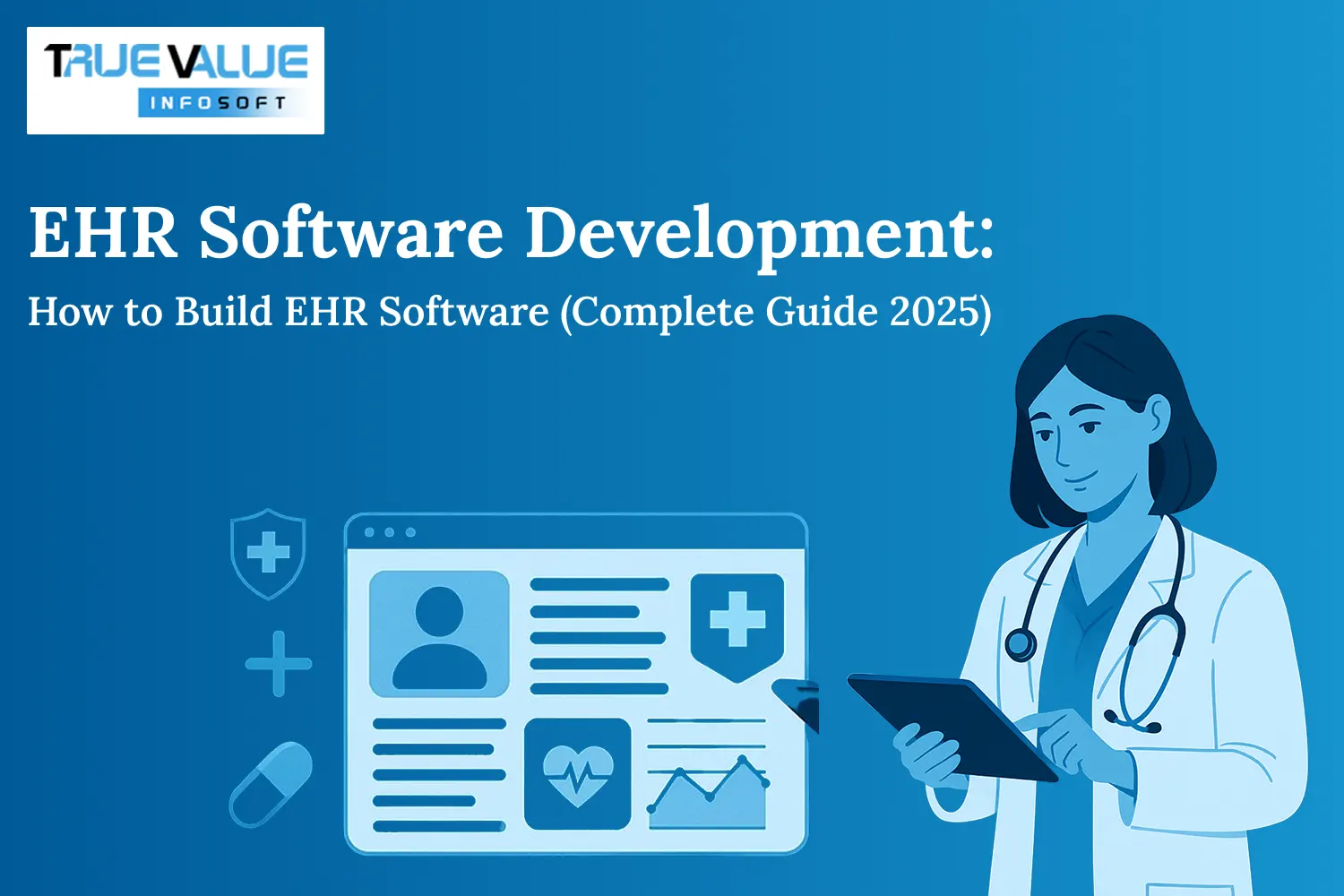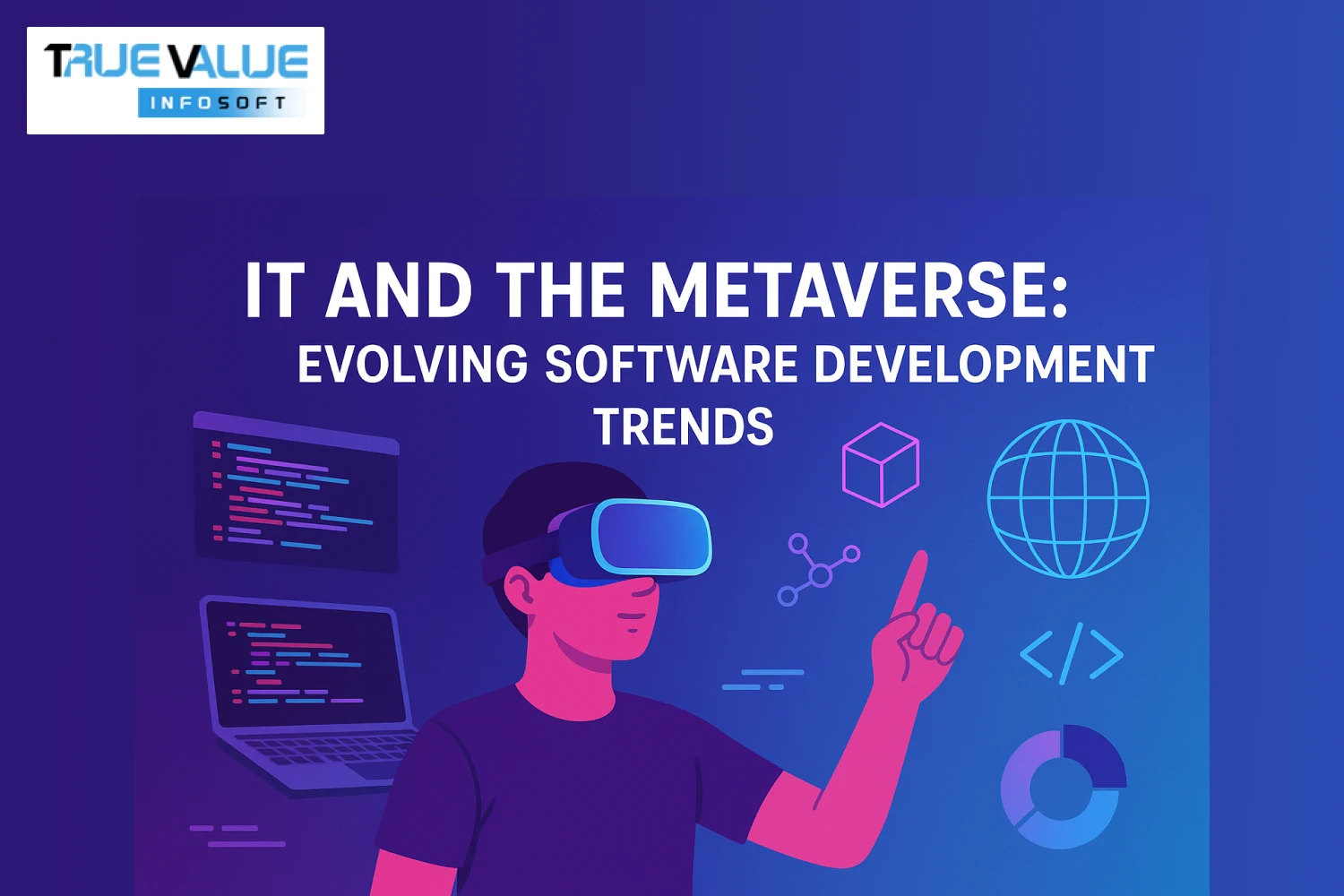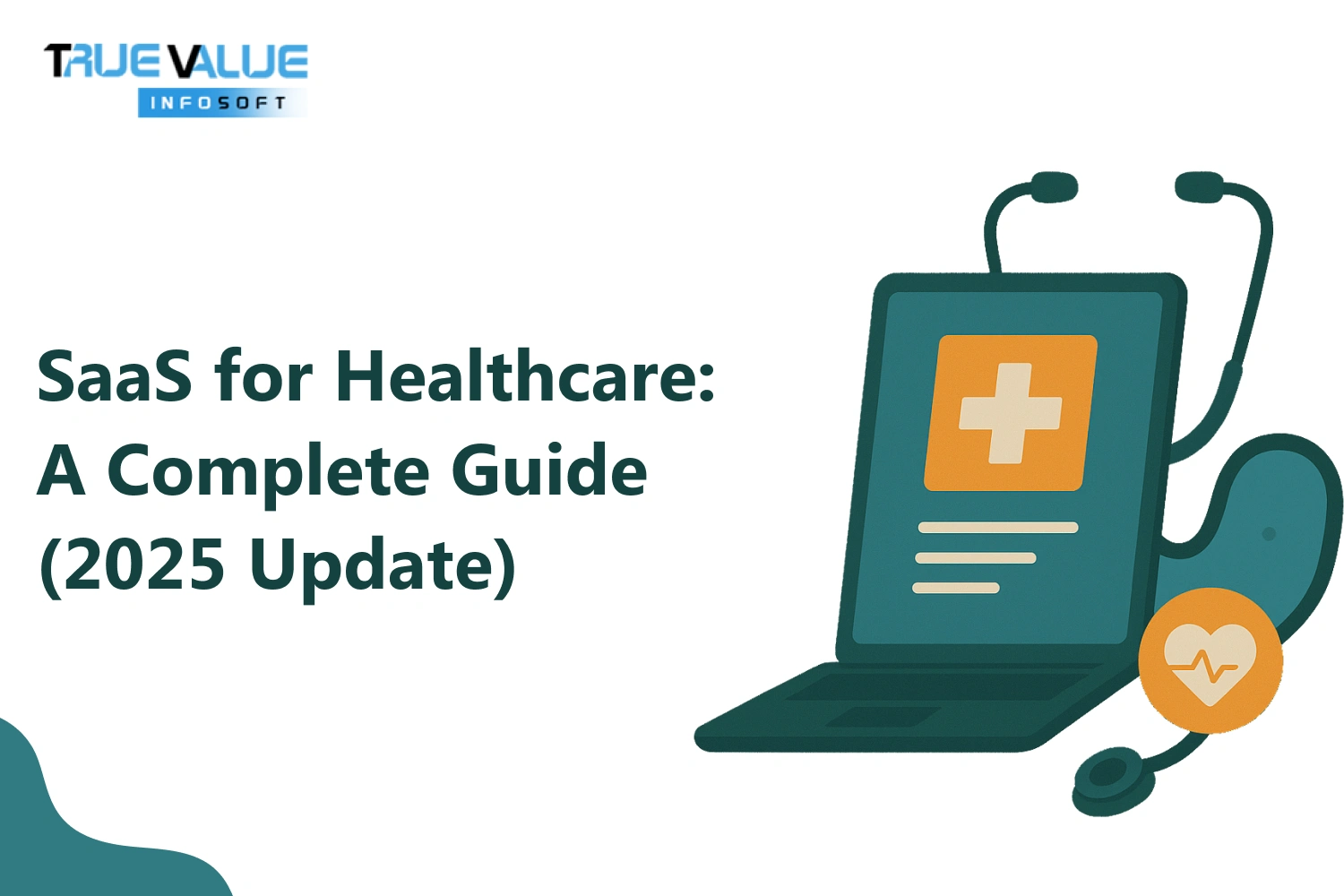Introduction
How can medical institutions improve patient outcomes, streamline workflows, and stay compliant with privacy regulations—all at the same time? The answer lies in EHR (Electronic Health Record) software development. But not just any software will do. You need a solution that’s secure, scalable, intuitive, and future-ready.
Developing such software requires deep technical expertise, healthcare industry knowledge, and compliance mastery—and that’s where True Value Infosoft, the best software development company in India, steps in. With proven experience in custom healthtech solutions, we empower hospitals, clinics, and telehealth providers to digitize care seamlessly.
In this comprehensive guide, we’ll explore what EHR software development is, how to build it, the full development process, essential features, cost considerations, and more. Whether you’re a healthcare startup or an established provider, this article will help you build EHR software that transforms care delivery.
What is EHR Software Development?
EHR (Electronic Health Record) software development refers to the process of designing, coding, and deploying digital systems that manage patient health information in a centralized and structured format. EHRs are more than just digital versions of paper charts—they offer real-time, patient-centered records that make data instantly available and secure for authorized users.
A robust EHR system includes patient demographics, medical history, medications, immunization dates, allergies, lab results, radiology images, and more. It also integrates with practice management, billing systems, and health information exchanges (HIEs).
Key Goals of EHR Software:
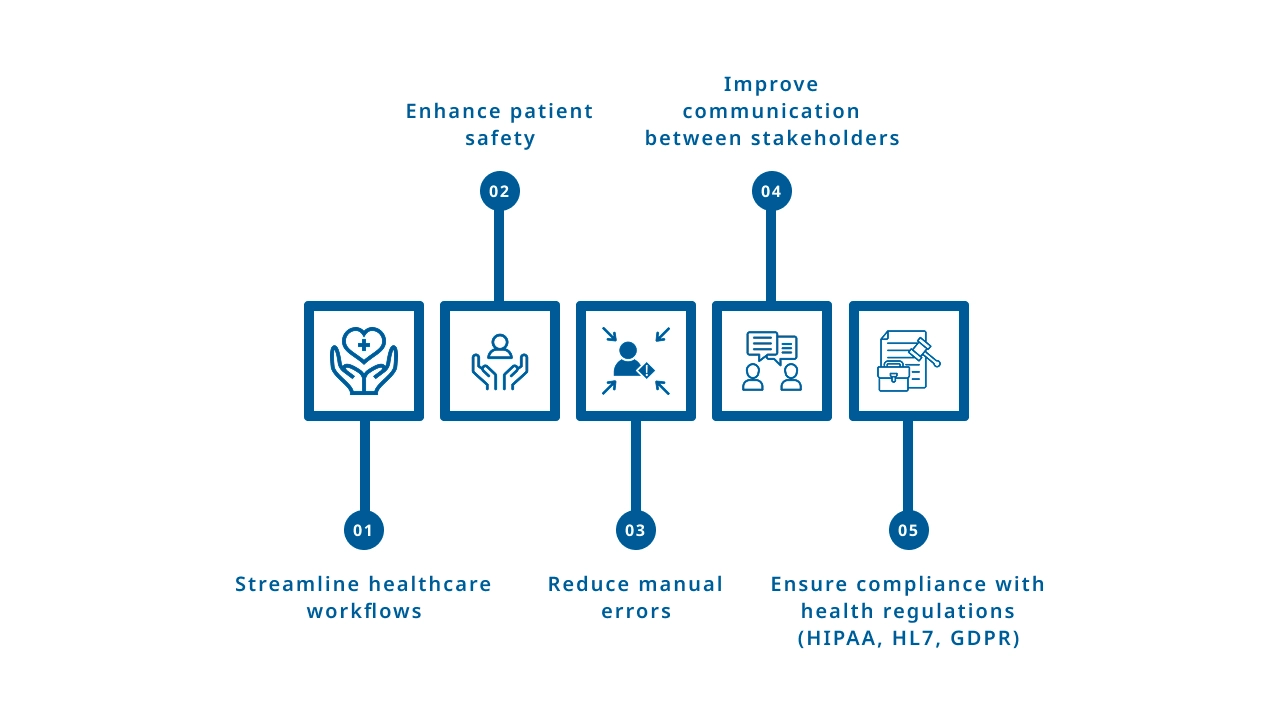
- Streamline healthcare workflows
- Enhance patient safety
- Reduce manual errors
- Improve communication between stakeholders
- Ensure compliance with health regulations (HIPAA, HL7, GDPR)
Why Is EHR Software Crucial in 2025?
Healthcare is becoming more digital every day. By 2025, most hospitals and clinics are expected to operate with some form of EHR software. This digital transformation is driven by:
- Regulatory Pressure: Governments mandate digital record-keeping.
- Rising Patient Expectations: Patients want access to their health records.
- Operational Efficiency: Digital systems save time and reduce errors.
- Data-Driven Insights: EHRs help improve care through analytics.
How to Build EHR Software: Step-by-Step
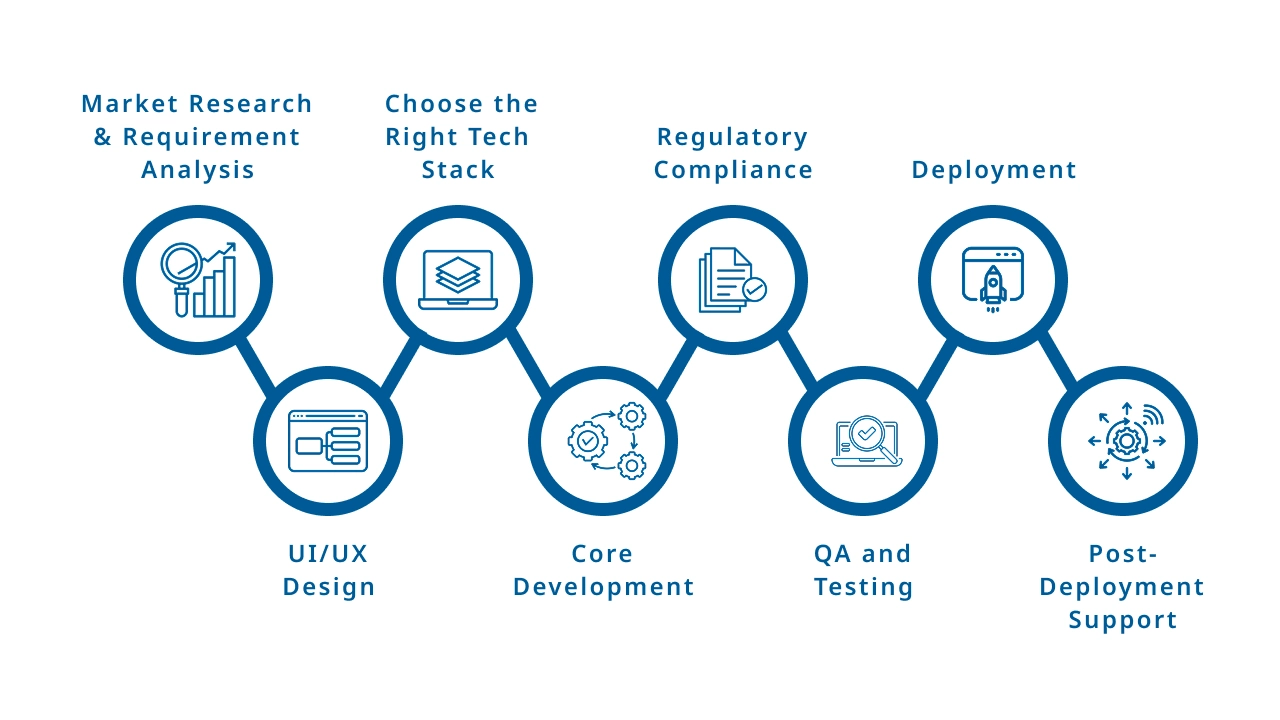
Building EHR software is a multi-phase process that combines healthcare knowledge with technical expertise. Here's a complete roadmap:
1. Market Research & Requirement Analysis
- Identify the target users (clinics, hospitals, private practices)
- Understand regulatory compliance (HIPAA, HL7, FHIR)
- Analyze competitor software
- Gather feature requirements (appointment scheduling, e-prescriptions, etc.)
2. UI/UX Design
- Design a user-friendly interface
- Ensure accessibility and responsiveness
- Wireframes, mockups, and user journey maps
3. Choose the Right Tech Stack
- Frontend: React.js, Angular, Vue.js
- Backend: Node.js, .NET, Java, Python
- Database: MongoDB, PostgreSQL, MySQL
- Cloud: AWS, Azure, Google Cloud
- Security: SSL/TLS, OAuth2.0, end-to-end encryption
4. Core Development
- Modular and microservice architecture
- Build patient profile management
- Implement appointment scheduling
- Add e-prescription and lab integration
- Develop secure messaging and alerts
- Integrate APIs and third-party tools
5. Regulatory Compliance
- Implement HIPAA, GDPR, HL7, and FHIR standards
- Data encryption and access control
- Regular audits and data backup mechanisms
6. QA and Testing
- Manual and automated testing
- Security and penetration testing
- Usability and performance testing
7. Deployment
- Deploy on cloud (AWS, Azure)
- Use CI/CD pipelines for smooth release
- Ensure rollback and versioning systems
8. Post-Deployment Support
- Bug fixes and patches
- System updates and scaling
- User training and technical support
Key Features of a Modern EHR System
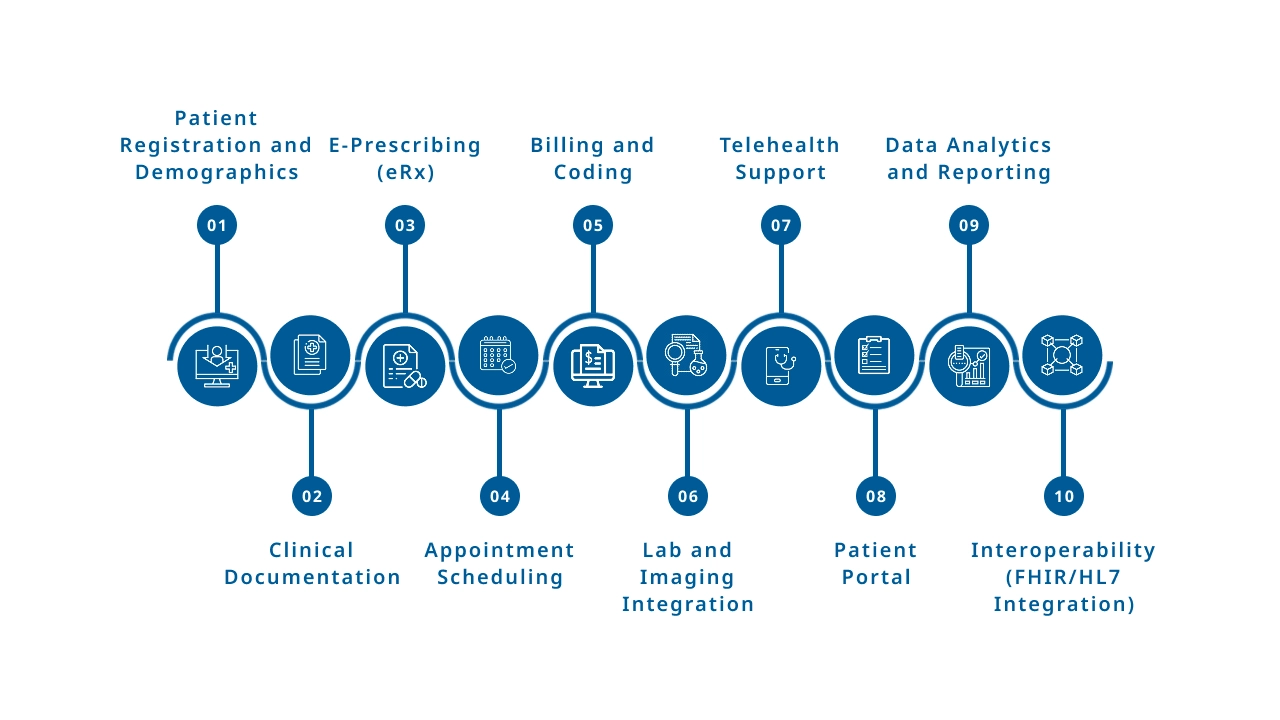
- Patient Registration and Demographics
- Clinical Documentation
- E-Prescribing (eRx)
- Appointment Scheduling
- Billing and Coding
- Lab and Imaging Integration
- Telehealth Support
- Patient Portal
- Data Analytics and Reporting
- Interoperability (FHIR/HL7 Integration)
Technologies Used in EHR Software Development
- AI & Machine Learning: For predictive analytics and diagnostics
- Blockchain: To ensure secure and immutable data records
- Cloud Computing: For remote access and scalability
- IoT Integration: Wearables and remote patient monitoring
- Mobile Development: Flutter, React Native for cross-platform access
- FHIR (Fast Healthcare Interoperability Resources): Ensures interoperability between systems
Security & Compliance in EHR Software
Security is non-negotiable in EHR software. Here’s what’s needed:
- End-to-End Encryption
- Role-Based Access Control (RBAC)
- Two-Factor Authentication (2FA)
- Regular Audits and Penetration Testing
- HIPAA Compliance (USA)
- GDPR Compliance (EU)
- HL7 & FHIR Standards
Challenges in EHR Software Development
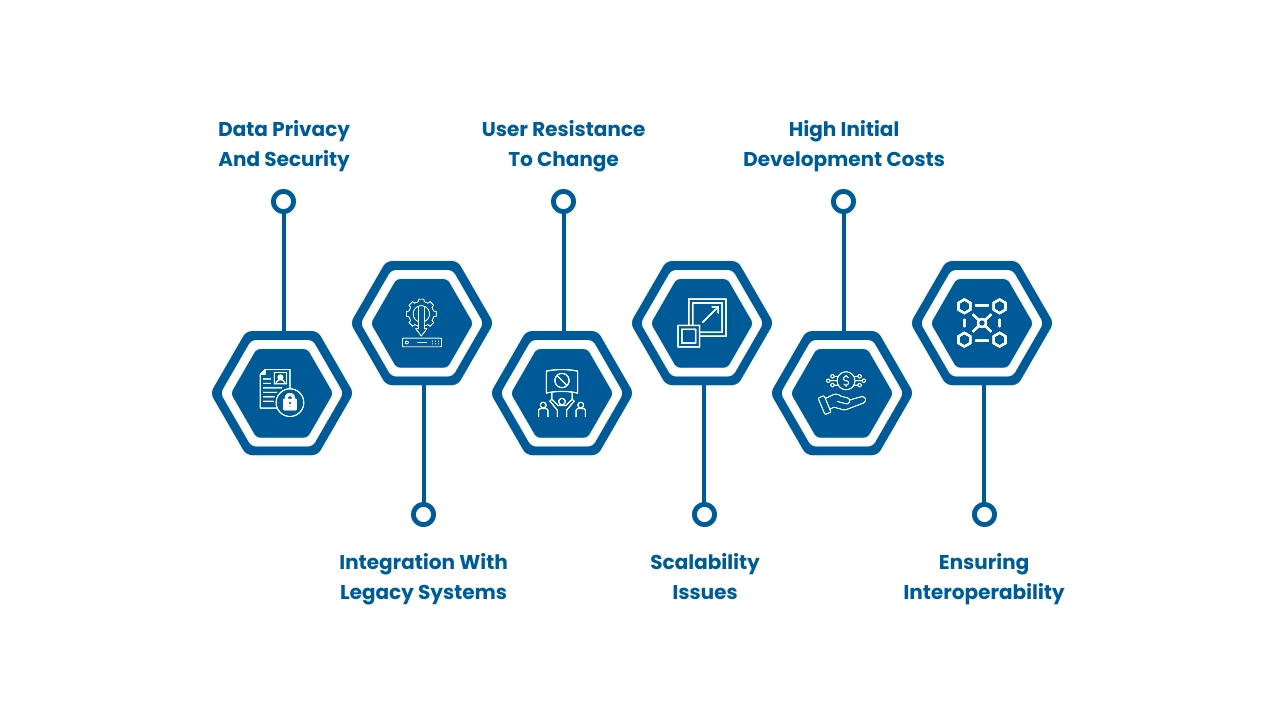
- Data Privacy and Security
- Integration with Legacy Systems
- User Resistance to Change
- Scalability Issues
- High Initial Development Costs
- Ensuring Interoperability
Overcoming these requires partnering with a development firm that understands the healthcare domain and regulatory landscape.
Cost of Developing EHR Software in 2025
The development cost varies based on complexity, features, and region. Here’s a breakdown:
| Type | Cost (USD) |
|---|---|
| Basic EHR Software | $40,000 - $80,000 |
| Medium Complexity | $80,000 - $150,000 |
| High-End Custom EHR | $150,000 - $300,000+ |
| Ongoing Maintenance | 15-20% of development cost annually |
Factors affecting cost:
- Feature set
- Tech stack
- Development team size
- Location (India vs USA)
- GDPR Compliance (EU)
- Compliance and security levels
Benefits of Custom EHR Software
- Tailored to specific needs
- Full control over features and updates
- Better integration with in-house systems
- No vendor lock-in
- Higher data security
- Scalable and future-ready
Why Choose True Value Infosoft for EHR Software Development?
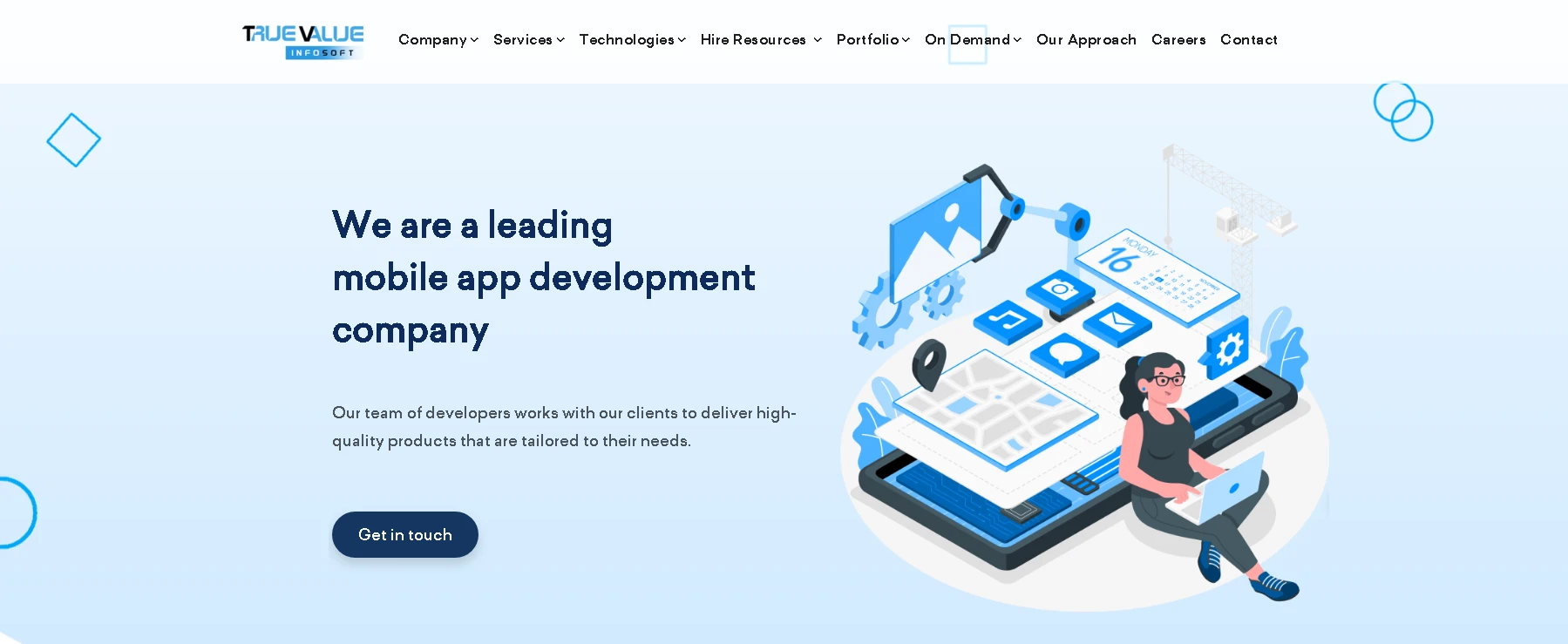
At True Value Infosoft, the best software development company in India, offers top-notch healthcare software solutions tailored for your clinic, hospital, or healthtech startup. Here’s why clients trust us:
- Proven Healthcare Expertise: With years of experience in medical software, we understand regulatory requirements, UX standards, and real-world clinical challenges.
- End-to-End Development: From ideation to post-launch support, we handle everything—including UI/UX design, backend, mobile apps, and APIs.
- Regulatory Compliance: We build HIPAA, GDPR, HL7, and FHIR-compliant solutions that stand up to the highest security standards.
- Scalable & Secure Architecture: Our cloud-based and microservices-driven approach ensures high performance, even as your business grows.
- Agile Development: We follow agile methodologies for faster delivery and iterative improvements.
- Cost-Effective Services: Get high-quality solutions at a fraction of Western development costs without compromising quality.
Whether you need a basic MVP or a full-featured hospital-grade EHR, True Value Infosoft is your trusted tech partner.
Future Trends in EHR Software Development
- Voice-Powered EHRs: Using NLP for voice note-taking
- AI Integration: Predictive diagnostics and smart alerts
- Patient-Centric Design: Empowering patients with more control
- Wearables & IoT: Continuous data from fitness bands and monitors
- Decentralized Data Storage: Leveraging blockchain
- Telehealth Maturity: EHRs fully integrated with virtual care platforms
Conclusion
EHR software development isn’t just about building a digital chart—it’s about reshaping the healthcare experience. A well-designed EHR can streamline operations, improve patient care, ensure data security, and future-proof your practice.
By following the right development process, using the best technologies, and staying compliant with regulations, you can create a powerful system that transforms how care is delivered. And if you're looking for the right partner to build your EHR solution, look no further than True Value Infosoft, mobile app development company in India.
We combine healthcare expertise with cutting-edge tech to bring your vision to life. Let’s build the future of digital healthcare—together.
FAQs
The development timeline ranges from 4 to 12 months depending on the features, complexity, and testing involved.
EMR (Electronic Medical Records) is limited to one practice, while EHR (Electronic Health Records) is a comprehensive system that shares data across healthcare providers.
Yes, for any system handling patient health data in the US, HIPAA compliance is mandatory to ensure privacy and data security.
Absolutely. Modern EHR systems support APIs and HL7/FHIR standards for integration with billing, lab, imaging, and pharmacy systems.
Hiring a top Indian company like True Value Infosoft offers cost-effectiveness, high-quality output, domain expertise, and access to a large talent pool.
